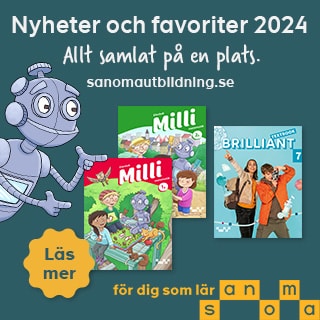Lärares möten med sociala medier: applikationer i behov av explikationer
Niclas Ekbergs avhandling visar att lärarnas erfarenheter av sociala medier är komplexa. Enkelheten i användningen bör inte överskattas eller överdrivas, vare sig det gäller lärare eller elever. Sociala medier är en resurs som motiverar och stimulerar, men de är inte någon given och självklar väg till en utvecklad pedagogik eller ett rikare lärande i skolan.
Niclas Ekberg
Professor Eva Alerby, Institutionen för Konst, kommunikation och lärande, Luleå tekniska universitet
Professor Per-Olof Erixon, Institutionen för Estetiska ämnen, Umeå universitet
Luleå tekniska universitet
2012-03-16
Lärares möten med sociala medier: applikationer i behov av explikationer
Teachers’ encouters with social media: applications in need of explications
Institutionen för konst, kommunikation och lärande
Teachers’ encouters with social media: applications in need of explications
The purpose of this dissertation has been set against the background of both existing research and teachers’ perceptions and experiences with the aim to clarify and better understand what constitutes the teacher’s encounter with social media in teaching. The theoretical starting point in hermeneutical phenomenology in accordance with Heidegger, Gadamer and Ricœur has brought with it not merely the resolve to describe the encounter’s context of meaning, but also the forward-looking striving to point out its possibilities. The study, motivated in particular by the new Swedish IT policy declaration and the new steering documents for compulsory and upper secondary schools, is based on two questions at issue: what perspective towards the encounter between social media and education can be detected in existing research? How does the teacher perceive the use of social media in education? To answer the questions, two sub-studies have been carried out. One comprises a survey of the literature, in which above all international scientific publications with relevance to the use of social media in education have been analysed. This has formed the context for the second part of the study, which comprises individual in-depth interviews with eight teachers working in compulsory schools and upper secondary schools respectively. The results of the study show that the encounter with social media brings both opportunities and challenges. The results therefore to some extent support expectations of the potential of social media in education, such as the encouragement of group processes, pupils’ increased commitment in and influence over the choice of methods, and the forms of presentation and multimodal expression and creativity. The results indicate at the same time apprehension over the user’s exposure that transparency brings, the difficulty of breaching the dominance of the written word, the challenges of the temporal and spatial limits and the changeability and complexity of the sometimes impenetrable technology.
The results also indicate undue expectations and an unfortunate approach as characteristics of the teacher’s encounter with the new technology. One example of such an unfortunate approach is the clichéd picture of two separate and homogeneous user groups, i.e. a young generation of expressive super-users and an older generation of digitally impotent immigrants, which creates problems for the teachers’ relationship towards technology use in school. Another is the perception that technology in itself leads to a desired approach and activities, in particular interactivity between pupils. Yet another is the perception that technology in itself leads to a desired approach and activities, in particular interactivity between pupils. Social media should thus be seen as a technology that is as yet incompletely negotiated, a technology to some extent subject to conflicting interests of teachers and pupils, and at the same time – with regard to content and structure, educational goals and self-representation – as an arena for negotiation. This perspective offers an understanding of its meaning in a context of teaching and learning activities, and brings an explanation for the challenges that its use brings. A negotiational perspective of that type underlines the importance of educational aims and teacher strategies. There is in the dissertation a discussion of the possibility to broaden the allocation of responsibilities and roles by not perceiving the teacher as the self evident hub around which the use of the technology is centred. The pupil can instead be permitted to form the starting point for the use and ownership of the technology. The dissertation pays particular attention to empowerment of both the teacher and the pupil to design and redesign personal Web and learning environments, as well as the value of conquering an arena of opportunities for richer, multimodal representations – to express more than that which can be captured through the written word. Social media can in addition be utilised as being-with and as interpretable text. The new technology means not only that we can relatively easy, compared to the last generation’s Web technology, illustrate our own actions, experiences, reflections and opinions: we are in addition surrounded by an increasingly intense stream of other people’s expressions and activities. These activities can be interpreted as texts having something meaningful to say about the world, the other person, and myself
Relaterade länkar

Undervisa i artificiell intelligens
 Gy–Vux
Gy–Vux 







